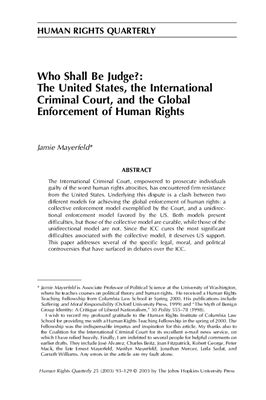Human Rights Quarterly 25 (2003) 93–129 © 2003 by The Johns Hopkins
University Press
The Inteational Criminal Court, empowered to prosecute individuals
guilty of the worst human rights atrocities, has encountered firm resistance
from the United States. Underlying this dispute is a clash between two
different models for achieving the global enforcement of human rights: a
collective enforcement model exemplified by the Court, and a unidirectional
enforcement model favored by the US. Both models present
difficulties, but those of the collective model are curable, while those of the
unidirectional model are not. Since the ICC cures the most significant
difficulties associated with the collective model, it deserves US support.
This paper addresses several of the specific legal, moral, and political
controversies that have surfaced in debates over the ICC.
The Inteational Criminal Court, empowered to prosecute individuals
guilty of the worst human rights atrocities, has encountered firm resistance
from the United States. Underlying this dispute is a clash between two
different models for achieving the global enforcement of human rights: a
collective enforcement model exemplified by the Court, and a unidirectional
enforcement model favored by the US. Both models present
difficulties, but those of the collective model are curable, while those of the
unidirectional model are not. Since the ICC cures the most significant
difficulties associated with the collective model, it deserves US support.
This paper addresses several of the specific legal, moral, and political
controversies that have surfaced in debates over the ICC.

